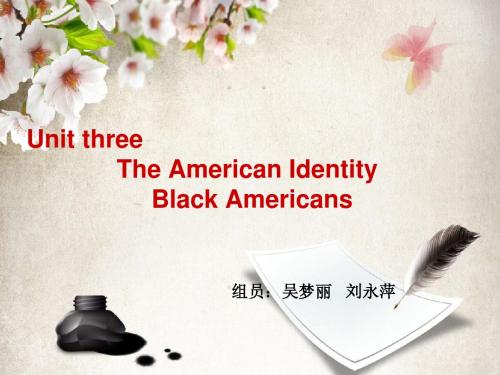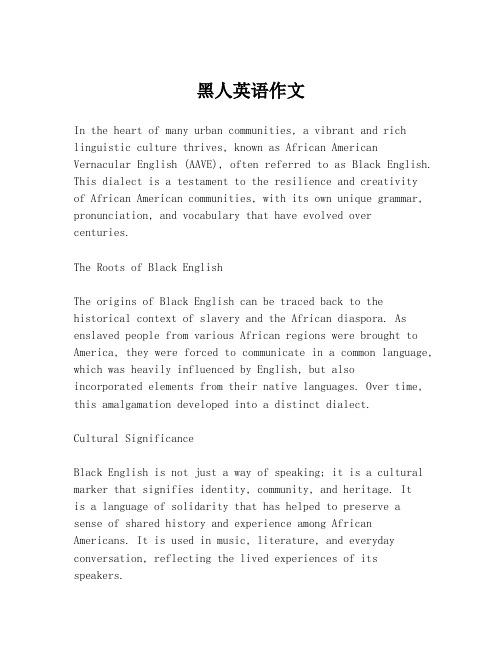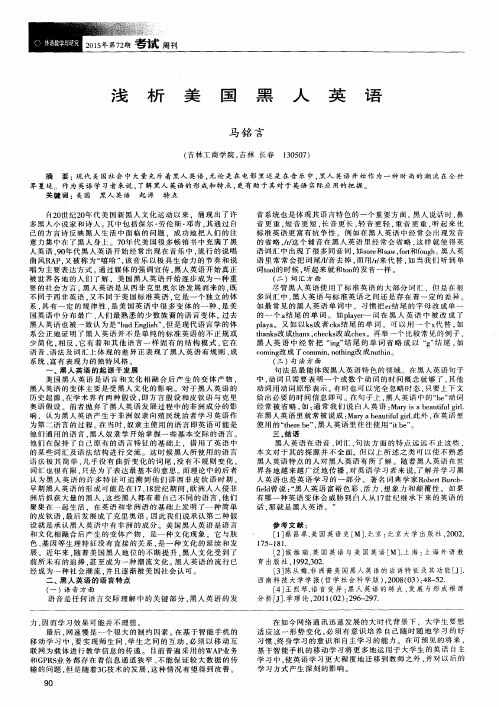黑人英语
黑人英语与标准美国英语差异之探讨

另外一j 孰姒 为, ^ 黑 英语( 来源于克里奥耳语( o ) 雎 饿 1。 e 原因是美国第—代黑人讲的是一种受非洲语言影响很深的克里奥耳
 ̄(r l E s) dc o  ̄Uh。同时, r ee 随善 会的向前发展, 由于受标准美国英 : 也 语 的影响, 克里 单 噼 电 演变为非克里奥耳化, 形成了一 种独特的英语变体。那么, 这种变体的英语在现今加勒比海地区所发 现的克里奥耳英语有着惊 人的相似之处。不过, 有关黑 ^ 英语( 、 匝 , )
的偏见, 而将她作为—种独特韵英语变懒 Ⅱ 以考察和研究。
问题的认识不尽相同。—般来说 , 有两种看法被普遍接受。一种看法
认为, 黑人英语来源于英国各地的各种方言, 原因是在黑人英语( 、 匝 , )
中人们随处可以发现英国某些方言所存在的古老特征。例如, 在黑人
英语( ) 的 ^ I 中 Ev 们普遍不发元音 后的[ 音, 6 怍 , r 常将[ ] 豫晕 田 将 皆
的起源问题, 在语言学界仍然处于进—步探讨的阶段。
语的一种种族集团变体( hiv】 。他仃 为, ^ e n ae t c 人 黑 、 ( V有 英语 避 )
别于标准美尽 语 (A )因而 ,、 S E, ^ 们可以根据对方谣 l 断出她是属 于两个种族集团的哪—个。这种情况 主要表现为白人住在黑人中间 或黑 ^ 住在白人中间这类异常的情况下, 他们各 自习得的语言模式就 是在该地区占支配地位的种族集团的语言模式。有别于以上两种观 点, —些语言学家认为, 由于黑 ^ 英语( H 通常是指居住在美国—些
黑 英 与 准 国 语 异 探 人 语 标 美 英 差 之 讨
● 冯 利
( 内蒙古农业大学 外国语 言学院, 内蒙古 呼和浩特 00 1 ) 10 8
【英语国家概况】【USA 美国黑人】

However,long after 1865,the dominant whites in most of the South were still finding ways of excluding black citizens from real equality. 然而,1865后不久,在大多数南方白人占主导地位的仍然 是从寻找真正的平等不包括黑人公民的途径。
The status of Black now
Discrimination against blacks, both in admission to all public places and in employment, is now illegal. While formal discriminations have decreased and old forms of segregations have been dismantled, subtle patterns of informal discrimination in housing, employment, education and virtually every social sphere still persists. 对黑人的歧视,无论是在进入所有公共场所和就业, 现在是非法的。虽然正式的歧视已经减少和旧形式 的偏析已被拆除,微妙的住房,就业,教育非正式 的歧视的模式和几乎所有社会领域仍然存在。
Martin Luther King
By the 1970, blacks were registered as voters in the South almost in the same proportion as whites, and many blacks were elected to important offices in southern states. Over the past three decades, blacks have been elected as mayors of several of the nation’s biggest cities, including Chicago and Washington, D.C.; others have been elected or appointed to many of the highest national and state offices in the South as well as in the North, including the Cabinet and the Supreme Court. There are now some thousands of black millionaires, not only athletes and entertainers, but also in business and other professions.
汉英颜色词“黑”和“白”之议

汉英颜色词“黑”和“白”之议On Chinese and English Color Words “Black” and “White”中文摘要我们知道,语言和文化之间有着千丝万缕的关系。
语言既是文化的一部分又是文化的一面镜子。
一个民族的语言折射出这个民族纷繁多彩的文化形态。
根植于两种不同的文化背景之中的英汉两种语言之间不可避免地存在着巨大的差异。
因此,对从事词语研究,尤其是研究英汉词语差异的人来说,探讨语言的文化差异是一个十分重要的课题,必须分析和比较词语所蕴涵的文化内涵。
本文以“黑” 和“白”两个颜色词作为研究对象,通过大量的例证,从英汉对比的角度来说明汉语的“黑” 和“白”两个颜色词和英语的“black”和“white”两个颜色词所包含的各自的褒贬国俗语义及“颜”外之意。
关键词:颜色词;褒贬国俗语义;“颜”外之意AbstractAs we know, there is a countless relationship between language and culture. Language is not only one part of culture, but also a mirror of it. A nation’s language reflects its numerous and complicated cultural form. The two kinds of language ------ English and Chinese, which rooted in two completely different cultures, inevitably exist great difference in culture. Therefore, it is a very important task for people who are engaged in words study, especially in words study between English and Chinese, to probe into the cultural differences in language. In terms of comparison and some examples, this essay explains the commendatory and derogatory terms on national connotation of the two color words “black” and “white” and their implication.Key words: Color Words; Commendatory and Derogatory Terms on National Connotation; Implication一、引言“没有一个人用纯洁而无偏见的眼光看待世界。
黑人英语会话

黑人英语会话Black English, also known as African American Vernacular English (AAVE) or African American English (AAE), is a distinct dialect of English spoken by many African Americans in the United States. It has its roots in West African languages and various dialects of English spoken by slaves brought to America during the Atlantic slave trade. Over time, it has evolved as a unique form of language with its own grammar, vocabulary, pronunciation, and cultural influences. In this article, we will discuss some common phrases and expressions used in Black English dialogues.Greetings and Introductions:1. "What's up?" – This is a common way to ask how someone is doing or what they are currently occupied with.2. "Hey, y'all!" – Y'all is a contraction of "you all" and is commonly used in Black English to address a group of people.3. "How you doin'?" – This is an informal way to ask someone how they are.Expressions of Agreement:1. "I feel you" – This phrase is used to express understanding or empathy with someone's thoughts or feelings.2. "That's true, true" – This double repetition emphasizes agreement or acknowledgement of a statement.3. "Word" – Equivalent to saying "true" or "I agree." Expressing Disagreement:1. "Nah, I don't think so" – Nah is a colloquial form of "no," and this phrase is used to disagree with someone or their statement.2. "You trippin'" – Trippin' means someone is acting irrationally or foolishly. This expression is used to disagree with or criticize someone's behavior or ideas.3. "I ain't buying it" – This phrase means that one doesn't believeor accept what someone is saying.Expressions of Excitement:1. "I'm hyped!" – This means someone is very excited or enthusiastic about something.2. "That's lit!" – Lit means something is cool, excellent, or exciting.3. "I'm stoked!" – Stoked means being extremely excited or enthusiastic.Endearing Terms:1. "Bae" – Bae is a term of endearment that originated in Black English and is often used to refer to one's romantic partner or loved one.2. "Homie" – Homie is another term for "friend" or "buddy" in Black English.3. "My people" – This term refers to one's close friends or family members.Casual Expressions:1. "Bet" – This expression means "okay" or "I agree" and is often used to show assurance or confirm something.2. "Fam" or "Fam bam" – Fam is short for "family" and is used to refer to close friends or a tight-knit group.3. "I'm finna" – "Finna" is a contraction of "fixing to" and is usedto express an intention or an imminent action.It is important to note that Black English, like any other dialect, is a valid and valuable form of communication. It is deeply rooted in African American culture and should be respected and appreciated. Understanding and appreciating the diversity of language is crucial for fostering inclusivity and promoting cultural understanding.。
黑人英语起源与发展研究中的若干问题

背景的 白人使用的语言……就未受过教育 的黑人而言 , 他们
语 文 学刊
2 0 1 3年 第 1 1期
黑 人 英语 起 源 与发展 研 究 中 的若 干 问题
0郭智勇 潘 洁
( 太原科技大学 外国语学院, 山西 太原 0 3 0 0 2 4 )
[ 摘 要 ] 对黑人英语起源和发展的研究在过去6 0多年中历经多次发展、 变化, 但研究者仍未达成共识。
黑人英语是美 国早期奴隶 制度 的直接产 物。黑人英 语
的英文名称历经 N e g r o E n g l i s h 、 B l a c k E n g l i s h 、 E b o n i e s 、 Mr i c a n A m e r i c a n E n g l i s h的变化 , 最终 固定 为 A f i r c a n me A r i c n a V e r - n a c L I l a r E n s u s h 。因为受 制于各种 因素 , 对黑人英语起源与 发 展 的研究 尚无权威定论 , 甚至还 存在 着重大分歧 。
说的英语和未受过教 育的 白人 说 的英语 几无 差别。也就 是
说, 黑人英语 表现 出 和 白人 英语 一样 的 区域 差异 和局部 变
化。 ” [ ]
“
… …
我们都认为 , 黑人英语 中的大量词汇 、 语法 和语音
—
黑人英语的特点及翻译方法——《哈克贝利费恩历险记》三个译本比较

黑人英语的特点及翻译方法——《哈克贝利费恩历险记》三
个译本比较
石蕊
【期刊名称】《科技信息》
【年(卷),期】2012(000)014
【摘要】黑色人种是世界上第三大人种,约占世界总人口的8.5%.大部分黑人由于地区自然条件、经济务件、教育水准等社会因素都较差,他们说的英语与所谓标准英语有着很大的差异.黑人英语(Black English)有着很鲜明的特色,是英语语言中的重要组成部分,并且除黑人外在社会中下层的其它人也广泛地使用.黑人英语从拼写和语法上就很容易的辨认出来,而汉语却没有此功能.本文将根据马克吐温的《哈克贝利费恩历险记》的三个译本对黑人英语的特点进行阐释说明,并对一些黑人英语的汉译进行分析探讨.
【总页数】2页(P170,173)
【作者】石蕊
【作者单位】沈阳师范大学
【正文语种】中文
【相关文献】
1.《哈克贝利·费恩历险记》中的儿童形象分析——来自哈克贝利·费恩的不同声音
2.《哈克贝利·费恩历险记》成时与许汝祉中译本中黑人英语的翻译对比赏析
3.从标记理论看《哈克贝利·费恩历险记》中黑人英语的翻译
4.浅谈黑人英语的汉译—
—从《哈克贝利·费恩历险记》三译本比较的视角5.哈克贝利·费恩的成人仪式探析——《哈克贝利·费恩历险记》赏析(英文)
因版权原因,仅展示原文概要,查看原文内容请购买。
黑人英语作文

黑人英语作文In the heart of many urban communities, a vibrant and rich linguistic culture thrives, known as African American Vernacular English (AAVE), often referred to as Black English. This dialect is a testament to the resilience and creativityof African American communities, with its own unique grammar, pronunciation, and vocabulary that have evolved over centuries.The Roots of Black EnglishThe origins of Black English can be traced back to the historical context of slavery and the African diaspora. As enslaved people from various African regions were brought to America, they were forced to communicate in a common language, which was heavily influenced by English, but alsoincorporated elements from their native languages. Over time, this amalgamation developed into a distinct dialect.Cultural SignificanceBlack English is not just a way of speaking; it is a cultural marker that signifies identity, community, and heritage. Itis a language of solidarity that has helped to preserve a sense of shared history and experience among African Americans. It is used in music, literature, and everyday conversation, reflecting the lived experiences of its speakers.Linguistic FeaturesThe linguistic features of Black English are diverse. For instance, it often uses non-standard verb forms, such as "He be running" instead of "He is running." It also has unique pronunciation patterns, like the dropping of the final consonant in words ending in '-ing' (e.g., "running" becomes "runnin'"). Additionally, AAVE may employ double negatives, which, while considered incorrect in Standard English, serve a specific communicative purpose in Black English.The Debate Over Standard EnglishThere is ongoing debate about the role of Black English in education. Some argue that it hinders academic achievement and should be discouraged, while others believe that it is a legitimate dialect that should be respected and incorporated into the educational system. Recognizing the value of Black English can help to foster a more inclusive and understanding learning environment.The Future of Black EnglishAs society becomes more diverse and multicultural, the importance of understanding and respecting linguistic diversity grows. The future of Black English lies in continued recognition and appreciation of its cultural and linguistic significance. Efforts to preserve and study this dialect can help to ensure that it remains a vibrant part of the linguistic tapestry of America.In conclusion, Black English is a complex and multifaceted dialect with deep historical roots and cultural significance. It is an integral part of the African American experience, and understanding it can lead to a greater appreciation for the richness of linguistic diversity in our society.。
浅析美国黑人英语

音 系 统 也 是 体 现 其语 言 特 色 的一 个 重 要 方 面 。 黑人说话时 , 鼻
音更重 , 短音更 短 , 长音 更长 , 轻 音更轻 , 重音更 重 , 听 起 来 比 标 准 英 语 更 富 有 抗 争 性 。 例 如 在 黑 人 英 语 中经 常 会 } H 现 发 音 的省略 . / r , 这 个 辅音 在 黑 人 英 语 里 经 常 会 省 略 , 这 样 就 使 得 英 语 词 汇 巾 出 现 了 很 多 同音 词 ,  ̄ H s o r e 和s a w' f o r t 和f n u 。 黑人 英 语里常 常会把词尾, l , 音 去掉 , 而 用/ r , 来代 替 . 如 当 我 们 听 到 单 词t o o l 的 时候 . 听 起 来 就 和t o o 的 发 音 一样 。 ( 二 )词 汇 方 面 尽 管黑 人英 语 使 用 了 标 准 英 语 的 大 部 分 词 汇 .但 是 在 很
一
多词汇 中, 黑 人 英 语 与标 准英 语 之 间还 是存 在 着 一 定 的差 异 。 如 最 常 见 的 黑 人 英 语 单 词 中 ,习 惯 把 e r 结 尾 的字 母 改 成 单 一 的一 个a 结 尾 的 单 词 。如 p l a y e r ~词 在黑 人英 语 巾被改 成 了 p l a y a 又 如 以k s 或者c k s 结 尾 的 单 词 ,可 以用 一 个 x 代替 , 如 t h a n k s 改成t h a n x . c h e c k s 改成c h e x 。再 举 一 个 比较 常 见 的 例 子 , 黑 人英语 中经常 把 “ i n g ” 结尾 的单 词省 略成 以 “ g ” 结尾 , 如 c o m i n g 改 成 了e o m mi n , n o t h i n g 改成 n u t h i n
- 1、下载文档前请自行甄别文档内容的完整性,平台不提供额外的编辑、内容补充、找答案等附加服务。
- 2、"仅部分预览"的文档,不可在线预览部分如存在完整性等问题,可反馈申请退款(可完整预览的文档不适用该条件!)。
- 3、如文档侵犯您的权益,请联系客服反馈,我们会尽快为您处理(人工客服工作时间:9:00-18:30)。
美国黑人英语概况
摘要:非裔美国黑人英语(AAVE)是美国化的黑人英语.。
也就是所说的黑人英语(Black English)。
它并不是像人们所说的那样“是英语的退化”.而是有着自己民族特色并建立了一定体系的语言变体。
非裔美国黑人英语的语言变体使其有了区剐于美国标准英语(Standard English)的语音、句法等特征。
关键词:非裔美国黑人英语形成特征
一、引言
民族的差异是引起语言社会变异的一个重要冈素。
无论是在英国或美国,尤其是在美国,不同民族的混合和不同文化的交融是一种极其重要的社会现象。
可以说,在引起语言社会变异的过程中。
民族因素往往是与地域和职业等闲索交织在一起的.具有各种民族背景的人在说英语的时候都难免不带上其本族对语言的影响或特点,这在受教育程度较低的人中尤为明显。
美国的黑人英语在以往几十年中逐步成为一种重要的社会方言.这主要是冈为美国黑人在社会生活中是一个令人注目的社会阶层。
非裔美国黑人英语曾被视为一种次等或低等的语言变体,这在语青学上是没有根据的。
黑人英语是从西非克单奥尔语发展而来的。
它既不同于西非英语,又不同于美国标准英语,它是一个独蕾的系统。
但是这种不同又呈现出一定的规律性。
它是美国英语许多变体中的一种,黑人英语在许多方面确实与别的变体有差异,但任何一种变体与别的变体之问总是存在筹异的。
这就是说,黑人英语在语音、句法等方面的变异有规律可循,并不是混乱或任意变化的。
要研究美国黑人英语概况,我们应当从美国黑人的历史,美国黑人英语与标准英语的差别,美国黑人英语的形成过程,美国黑人英语的特点以及美国黑人英语的影响几个方面出发研究探讨。
二、美国黑人的历史
美国黑人的历史可以追溯到16世纪美洲沦为欧洲殖民地的时期。
16~19世纪,欧洲殖民者从非洲(主要是西非、刚果和安哥拉)劫运大批黑人奴隶到美洲,其中半数以上运入今美国境内,主要在南部诸州的棉花、甘蔗种植场和矿山当苦工,深受白人种族主义者的残酷剥削和虐待。
随着美国工业的发展,南方的黑人陆续迁往北方和西北方城市。
1861~1865年南北战争后,虽然从法律上废除了奴隶制度,但是黑人仍受种族歧视和压迫,三K党的暴行严重威胁着黑人的生命安全。
三、美国黑人英语的形成过程
据官方统计,美国的黑人已有两千六百余万,约占美国总人口的12%之多。
他们多是被殖民主义者从非洲强行贩卖到美国的黑奴的后裔。
非裔美国黑人英语是在美国黑人文化和以美国社会为背景的黑人社区的发展I}1形成的一种方言.有些语言学家则认为.从奴隶贸易开始.直到20世纪60年代黑人英语主要是受南方白人英语方言的影响.所以.黑人英语是由美国南部方言直接派生出来的。
虽然语占学家们看法不一,但有一点就是。
本世纪大批美国黑人由南方向北方和西部迁移.这是美国黑人英语发展成为一种全国范围内的社会方言的主要原因。
那么,黑人英语究竟是如何形成的呢?让我们带着这一问题作进一步的探讨。
在美国,黑人几乎都是被当作奴隶从非洲贩运来的。
讲英语的欧洲人在与非洲人接触时,有时需要交流思想。
而非洲人与讲英语的欧洲人不生活在一起,也
不可能经常模仿他们的英语。
这样,他们之间的交往就必须借助于一种经过简化,有一定局限,但仍然保证不同语言背景的人日常交际的简单英语。
美国语言学家Steward和Dillard曾引用历史上大量证据证明.早在16世纪两非的许多地方就已经开始使用洋泾滨英语。
他们把非洲洋泾滨英语的发展与早期的以拉丁语为基础的洋泾滨相比较,认为这两种混合与形成的方式十分相似:以拉丁语为基础的洋泾滨语是用英语词来代替拉丁语词汇.而在非洲使用的洋泾滨语多是黑人。
因此,他们的洋泾滨语自然以非洲语言的词汇和结构为基础。
这种洋泾滨英语,里变得更加明碌。
黑人语言集团的这一发展一方面有助于刨造保留黑人英语的环境,使之成为一种全国范围内的独特方言,另一方面又通过黑人的文化、艺术、音乐和生活等对美国白人也产生了一定的影响。
以至于许多黑人英语的一砦用法已进入普通美国英语。
在美国,现在除了80%的黑人讲黑人英语外.还有纽约的波多黎各人和许多白人也操这种方言。
20世纪50年代.美国黑人运动的兴起和发展,不但提高了黑人的社会地位,还极大地促进了黑人英语的普及。
马克华德特和迪拉德(Marckward&Dillard。
1985)写道:“1979年6月底特律法庭决定承认黑人英语.这是黑人英语在法律上的一个里程碑。
但是作为社会方言,黑人英语直到80年代才被广泛承认。
从1619年第一批黑奴被贩卖到美国到1979年其语肓得到法律卜的承认,其间经过了长达360年的苦难与斗争。
黑人英语的成长如同其民族一样来之不易。
四、美国黑人英语的特点
美国黑人英语与标准英语的差别,主要可以体现在语音,拼写,句法上。
就语音而言,最为显著的语音特征是对词尾的辅音连缀进行简化。
在拼写上,最常见的,就是把er结尾的字母改成单一的"a";ks 或 cks结尾的文字,也以一个x 代替,因为ks(cks)和x的发音相同;o的用法也很特色,如Love改成了Luv;而有二文法已成为不只黑人使用,也要成为通行全美的通则了; re或e此种在快语速情况下几乎听不到的字,都被省略了。
句法上,黑人英语中的”be”动词经常被省略。
五、美国黑人英语的影响
黑人英语通过黑人的文化、艺术、音乐和生活等对美国白人也产生了一定的影响。
1993年3月至8月,有学者先后在美国俄勒冈州Molalla,Mc
Minnville,Eugene三地,对60名美国大中小学生作了一个书面调查,其设计
为:List all the single standard and non——stan.-dard words that carl be replaceably usedby people your age tO express assent,praise and applause.Then mark thewords the most often used. 结果发现,他们现在很少用good表达同意、赞扬以及喝彩,取而代之的却是一系列同义或近义词,其中一些大出我们意料之外。
随着黑人电影,说唱乐,hip hop,涂鸦等艺术的迅猛发展,黑人英语得到了更加广泛的普及。
